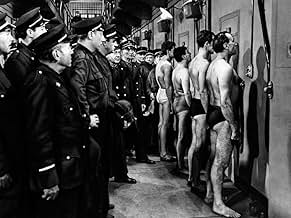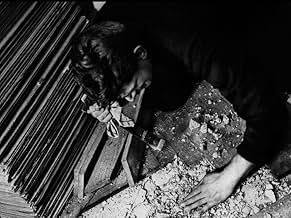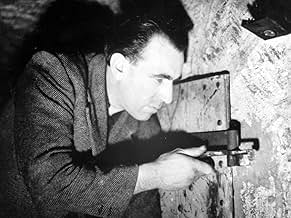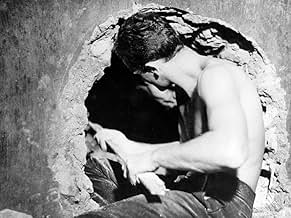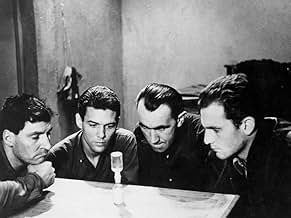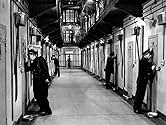Distrust and uncertainty arise when four long-term inmates cautiously induct a new prisoner into their elaborate prison-break scheme.Distrust and uncertainty arise when four long-term inmates cautiously induct a new prisoner into their elaborate prison-break scheme.Distrust and uncertainty arise when four long-term inmates cautiously induct a new prisoner into their elaborate prison-break scheme.
- Nominated for 2 BAFTA Awards
- 2 wins & 4 nominations total
Marc Michel
- Claude Gaspard
- (as Mark Michel)
Jean-Paul Coquelin
- Le lieutenant Grinval
- (as J. Paul Coquelin)
Albert Augier
- Un gardien
- (uncredited)
Jean Becker
- Un gardien
- (uncredited)
Mick Besson
- Deuxième plombier
- (uncredited)
Georges Bielec
- Figurant
- (uncredited)
Raymond Bour
- Un gardien
- (uncredited)
Philippe Dumat
- Un gardien
- (uncredited)
Gérard Hernandez
- Le détenu à l'infirmerie
- (uncredited)
Jean Luisi
- Un détenu
- (uncredited)
Storyline
Did you know
- TriviaThe scene where three different characters take turns breaking through the concrete floor of their cell is filmed in a single, nearly four minute long, shot.
- GoofsWhen Geo checks the corridor with the mirror and takes a break to say goodbye to his cellmates, he leaves the mirror in the hole. However, when he goes back to checking the corridor he has to stick the mirror back into the hole first.
- Quotes
[last lines]
Roland Darban: [stripped, facing the wall under guard] Poor Gaspard.
- ConnectionsFeatured in Mon père, il m'a sauvé la vie (2001)
Featured review
This film is riveting in its attention to the details of a prison escape and to the relations between the men involved. And even if you're not interested in the Marxist vision that inspires Becker in this last film of his, you will still be captivated by the story. In any case, to understand Becker's vision, I will necessarily have to give away the story so beware (and my analysis also makes the film sound much more schematic and polemical than it will appear to you on viewing it):
***SPOILER***
At the beginning of the film one of actors (clearly a car mechanic) approaches the camera and tells us that we are about to see a true story, his story. We are led to believe that it is the story of an escape from prison, and indeed we are taken to Paris' largest prison where a group of 4 cellmates, already plotting their escape, finds that they are unexpectedly joined by a new cellmate: a well-dressed (all prisoners wear their street clothes), somewhat effete, young man who nominally sells cars at (presumably) his father-in-law's dealership--in any case, it's clear that he doesn't really have to work or at least work hard for a living. On the other hand, the other four are clearly working-class guys who've drawn a bad card in life. After debating among themselves whether to let the pretty boy in on their plot, they decide to do so after they learn that he's in for attempted murder and stands to have a strong reason to want to break out.
Becker shows the extraordinary ingenuity of the working-class prisoners in contriving tools, in developing a postal system between cells, and in setting up a way of telling time where there are no clocks or church bells. The implication is: we, the working class, have the minds, the manual dexterity, and the willingness to work and to build our own civilization (minus the bourgeoisie). Meanwhile, the bourgeois type is astonished at how the working-class types are able to organize and think for themselves ('I've never met men like you before')- -and, above all, he is moved by their willingness to share their victuals and their plans for freedom with him. And it is just this solidarity and mutual support which Becker believes represents an alternative way to organize human society--an alternative to the self-centered world of the bourgeois. Note, for example, the character of 'Joe' who opts to not join in the escape because the police would harass his mother to death, but who still does not rat on the others even though it's clear he will have to do additional time and time in solitary after the breakout. Becker has a nice touch as well in the way he portrays the prison guards, also from the working-class: generally friendly towards the 'boys' in prison, with perhaps an authoritarian streak in them but no suggestion of a sadistic, brutish nature. So when 'Roland' says, 'Poor Gaspard,' after the latter has betrayed them (it was clear that he'd been tempted earlier to do so when he saw the taxi from the manhole cover), it is evident that the only real 'brute' is the bourgeois, who, in the end, will always turn on his pals (and his fellow man in general)if it serves his interest and who is bereft of the fellow-feeling which undergirds working-class life. So what about the claim that this is a true story? The actor who plays 'Roland' is a non-professional, but it's hard to imagine that he could be as young as he is if he had actually attempted 3 previous escapes and had to serve another long stretch for the failed attempt portrayed in the film. Instead, it's the 'true story' of the working class: a class dominated by the bourgeoisie but which resists and has the capability to guide itself without the bourgeoisie; a class which embodies the values of solidarity and the dignity of work--values which can become the foundation of an alternative civilization.
***SPOILER***
At the beginning of the film one of actors (clearly a car mechanic) approaches the camera and tells us that we are about to see a true story, his story. We are led to believe that it is the story of an escape from prison, and indeed we are taken to Paris' largest prison where a group of 4 cellmates, already plotting their escape, finds that they are unexpectedly joined by a new cellmate: a well-dressed (all prisoners wear their street clothes), somewhat effete, young man who nominally sells cars at (presumably) his father-in-law's dealership--in any case, it's clear that he doesn't really have to work or at least work hard for a living. On the other hand, the other four are clearly working-class guys who've drawn a bad card in life. After debating among themselves whether to let the pretty boy in on their plot, they decide to do so after they learn that he's in for attempted murder and stands to have a strong reason to want to break out.
Becker shows the extraordinary ingenuity of the working-class prisoners in contriving tools, in developing a postal system between cells, and in setting up a way of telling time where there are no clocks or church bells. The implication is: we, the working class, have the minds, the manual dexterity, and the willingness to work and to build our own civilization (minus the bourgeoisie). Meanwhile, the bourgeois type is astonished at how the working-class types are able to organize and think for themselves ('I've never met men like you before')- -and, above all, he is moved by their willingness to share their victuals and their plans for freedom with him. And it is just this solidarity and mutual support which Becker believes represents an alternative way to organize human society--an alternative to the self-centered world of the bourgeois. Note, for example, the character of 'Joe' who opts to not join in the escape because the police would harass his mother to death, but who still does not rat on the others even though it's clear he will have to do additional time and time in solitary after the breakout. Becker has a nice touch as well in the way he portrays the prison guards, also from the working-class: generally friendly towards the 'boys' in prison, with perhaps an authoritarian streak in them but no suggestion of a sadistic, brutish nature. So when 'Roland' says, 'Poor Gaspard,' after the latter has betrayed them (it was clear that he'd been tempted earlier to do so when he saw the taxi from the manhole cover), it is evident that the only real 'brute' is the bourgeois, who, in the end, will always turn on his pals (and his fellow man in general)if it serves his interest and who is bereft of the fellow-feeling which undergirds working-class life. So what about the claim that this is a true story? The actor who plays 'Roland' is a non-professional, but it's hard to imagine that he could be as young as he is if he had actually attempted 3 previous escapes and had to serve another long stretch for the failed attempt portrayed in the film. Instead, it's the 'true story' of the working class: a class dominated by the bourgeoisie but which resists and has the capability to guide itself without the bourgeoisie; a class which embodies the values of solidarity and the dignity of work--values which can become the foundation of an alternative civilization.
- How long is The Hole?Powered by Alexa
Details
- Release date
- Countries of origin
- Language
- Also known as
- The Night Watch
- Production companies
- See more company credits at IMDbPro
Box office
- Gross US & Canada
- $34,588
- Opening weekend US & Canada
- $6,756
- Jul 2, 2017
- Gross worldwide
- $34,588
- Runtime2 hours 11 minutes
- Color
- Aspect ratio
- 1.66 : 1
Contribute to this page
Suggest an edit or add missing content




